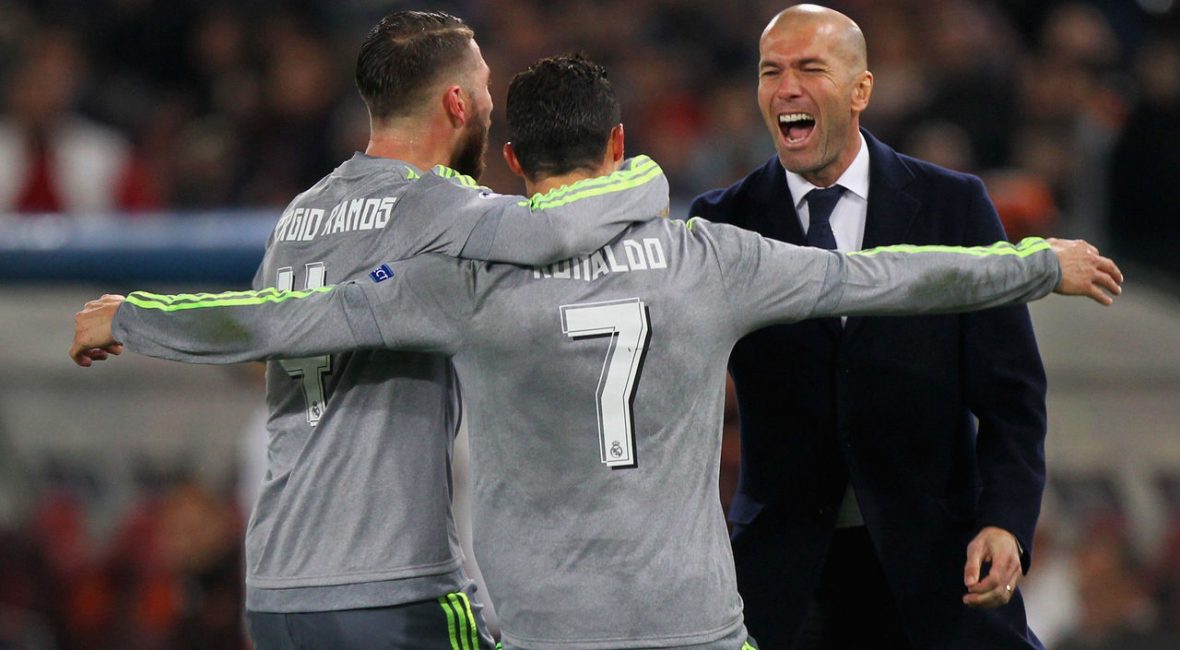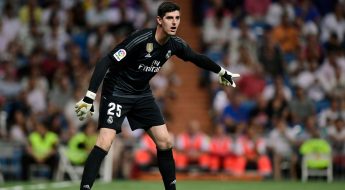Zidane's Real tenure was historic, but benefitted from luck and good timing

One of the toughest things to do in life is to quit while you’re ahead. On Thursday, Zinedine Zidane did just that, sweeping Manhattan-sized stacks from the betting table, vaulting the door of a convertible, and squeaking his wheels in the direction of an Iberian sunset.
Related: Zidane leaves Real Madrid days after winning 3rd straight Champions League title
A piece of silverware was procured every 97.6 days on average during his tenure, and Real Madrid won each of the eight finals he reached. However, people are still sceptical of Zidane’s trophy-laden two-and-a-half-year reign at the helm of Los Blancos’ senior throng. Was he simply a man in the right place at the right time? Was he lucky?
Instant respect
Zidane inherited a side that had grown tired of Rafa Benitez’s tactics, a defence-first handler who tried to school Cristiano Ronaldo in how to hit free-kicks – that, unsurprisingly, didn’t go down well – and lacked the man-management skills of his predecessor, Carlo Ancelotti. Real Madrid was in need of a respected figurehead so, in January 2016, it appointed Ancelotti’s former No. 2 and the inconsistent boss of its Castilla outfit. Except he was much more than that.
Zidane, a man who orchestrated Real Madrid’s midfield during his playing days, respected the club’s history of championing singular talent and wore his reputation like a bullet-proof vest to president Florentino Perez’s notoriously trigger-happy ways. He unbuckled the squad from Benitez’s assiduous style, and the players listened to a man who had plundered a World Cup, European Championship, three league titles, and one Champions League triumph during his playing career. Just like when he played, Zidane set the tempo, created, and expected those around to sway freely to his rhythm.

Soon, Real Madrid would win 12 league matches in a row and hoist the Champions League trophy. According to his critics, however, this was Zidane’s first slice of luck. Real Madrid’s run in the knockout stages consisted of Roma, Wolfsburg, and the infantile version of Pep Guardiola’s Manchester City – sluggish full-backs and all. By comparison, Atletico Madrid fended off PSV Eindhoven, Barcelona, and Bayern Munich before falling to its city rival in the final on penalties.
In the following season’s tournament, Bayern Munich was in the ascendency in the quarter-finals until referee Viktor Kassai harshly showed Arturo Vidal a second yellow. Then, in extra-time, his assistants failed to acknowledge Ronaldo was in an offside position when he fired Real Madrid ahead on aggregate. In La Liga, if it wasn’t for December’s late winner in Barcelona from Sergio Ramos, Real Madrid wouldn’t have won the title. Los Blancos weren’t taking control of matches, instead relying on their stars and lapses in judgment.
‘Real Madrid walk on water’
In the recently concluded campaign, it appeared Zidane’s luck was running out. His ageing side was no longer netting late winners in domestic play, and instead, losing at the Bernabeu to Real Betis, Leganes, and Villarreal. There was even a draw against Fuenlabrada. Zidane’s days appeared to be numbered when Los Blancos lost the El Clasico 3-0 at home in January.
But Real Madrid continued to successfully toe the tightrope during its continental commitments. The capital club was clearly second best against Tottenham Hotspur in the group stages and was overwhelmed by Juventus in the second leg of their quarter-final meeting until Ronaldo converted a disputed, last-second penalty amid a flurry of Gianluigi Buffon expletives. Real Madrid, somewhat undeservedly, was in the semi-finals.
The following round’s tussle with Bayern Munich was an entertaining, if surprisingly low-quality affair. Marcelo’s defensive deficiencies were exposed by the excellent Joshua Kimmich, and the Brazilian also went unpunished when he handled in the box. It wasn’t until Bayern goalkeeper Sven Ulreich made a mindless error that Real Madrid took control in the second leg. How good Ulreich’s opposite number, Keylor Navas, was between the sticks was evident in the shot count over the course of the two fixtures: Bayern had 39 attempts on goal, Real Madrid had 16.
“Real Madrid walk on water. You can never rule them out,” reflected French publication L’Equipe.
The 2018 final against Liverpool was a quintessential performance by Zidane’s Real Madrid. Loris Karius’ blunders were preyed upon, and Gareth Bale roused himself from the bench to score arguably the best goal in a Champions League final. But the game’s turning point had come much earlier when Mohamed Salah was substituted in the opening stanza after bumping with Ramos; if Real Madrid wanted one player out of the game, it was the Egyptian.
Related: Super-sub Bale inspires Real Madrid to Champions League glory over Liverpool

Once again, Real Madrid was successful yet unconvincing – or perhaps just plain lucky.
A flawless exit – but what’s next?
Zidane knew that it couldn’t last. In three straight Champions League finals, he only started 13 different players. His signings have often been brought in as backups, and the Frenchman made it known when Alvaro Morata, James Rodriguez, and Mariano Diaz were offloaded last summer that he prefers to oversee a more concentrated ensemble. Now, with much of the thin group predominantly in or around their 30s, he has left a team in need of a revamp that (barring a splurge that would likely fall foul of Financial Fair Play) may take a few years – there are echoes of Sir Alex Ferguson’s departure from Manchester United.
Just as he had arrived, the timing of Zidane’s exit is flawless.
To say Zidane’s success is built on luck and featured no tactical nous would be churlish – he separated from a long-standing 4-3-3 and flitted through a range of schematics, and his substitutions often had a positive impact on games – but he isn’t a manager who needs time to enforce or instill a philosophy on a club. His tactics are simple but effective, his trust in his players to express themselves instrumental and almost instantaneous when it comes to results, and he, as one of the most artful midfielders to grace the game, is already an inspiration to those who work under him.
Players don’t need months to become accustomed to his approach, yet they will feel liberated. Zidane – Real Madrid’s second-most successful manager with nine trophies in little over 28 months, below Miguel Munoz’s count of 15 trophies in 14 years – has made history and should keep his reputation in club football intact, instead moving into the world of national team management. Didier Deschamps is sitting on the best crop of youngsters in international football at France but has habitually shown an inability to find the right combination. Deschamps could conveniently make a hash of France’s World Cup campaign, leaving his old club and international teammate to pick up the pieces later this summer.
And for Zidane, you’d expect everything to fall in its right place.
(Photos courtesy: Getty Images)




